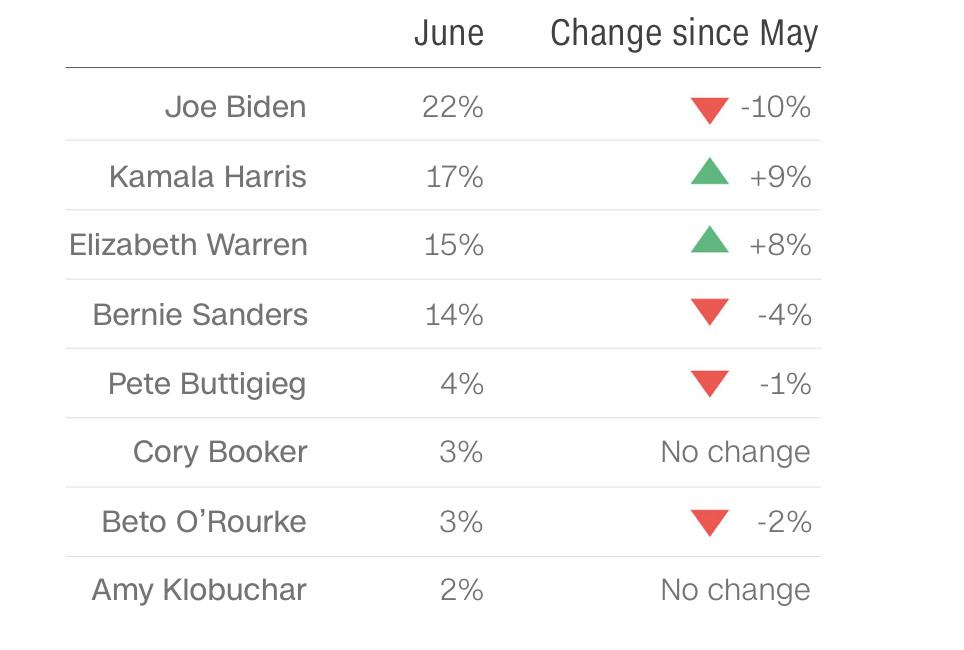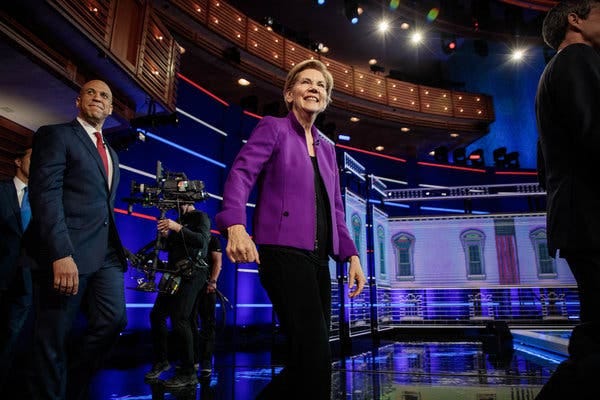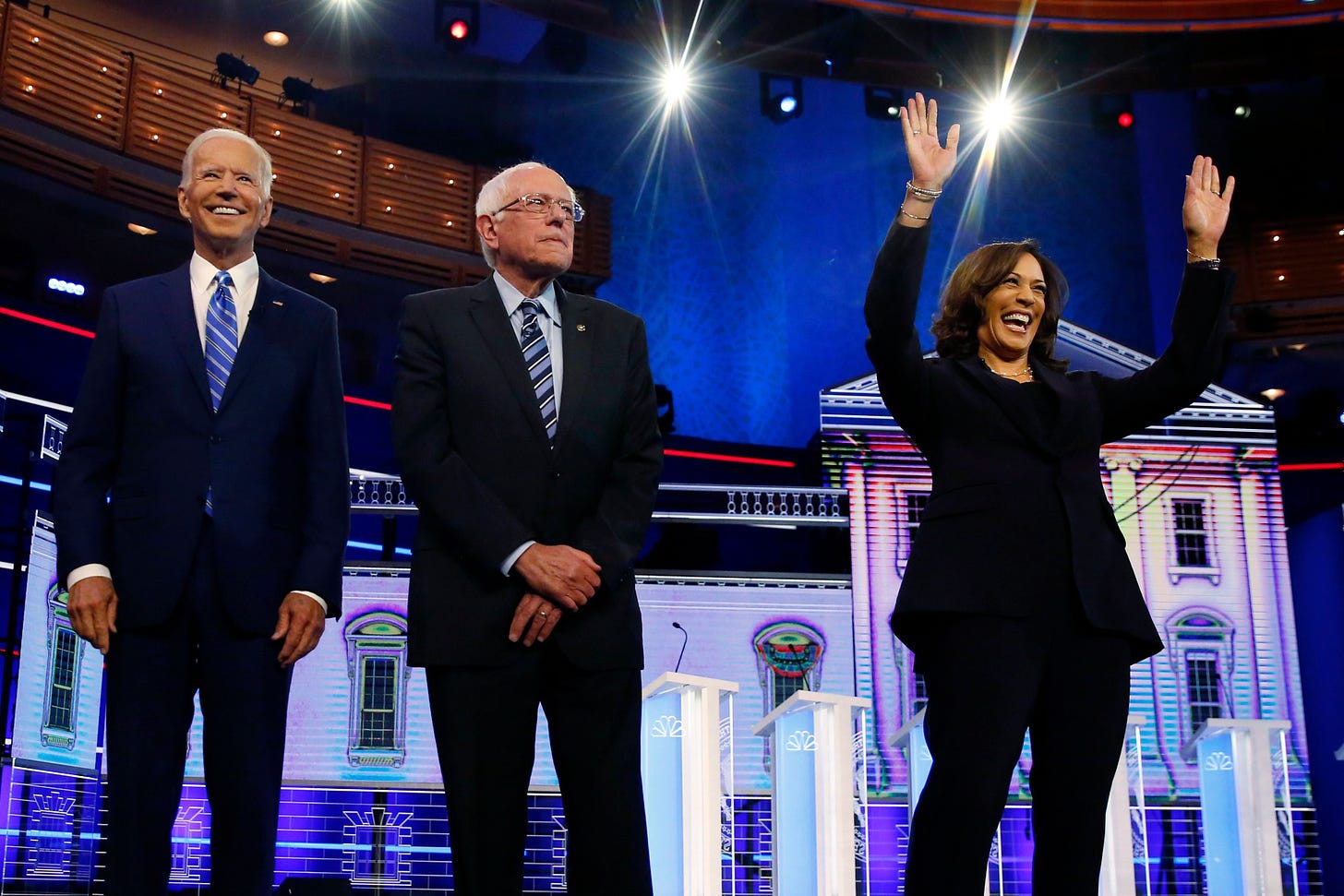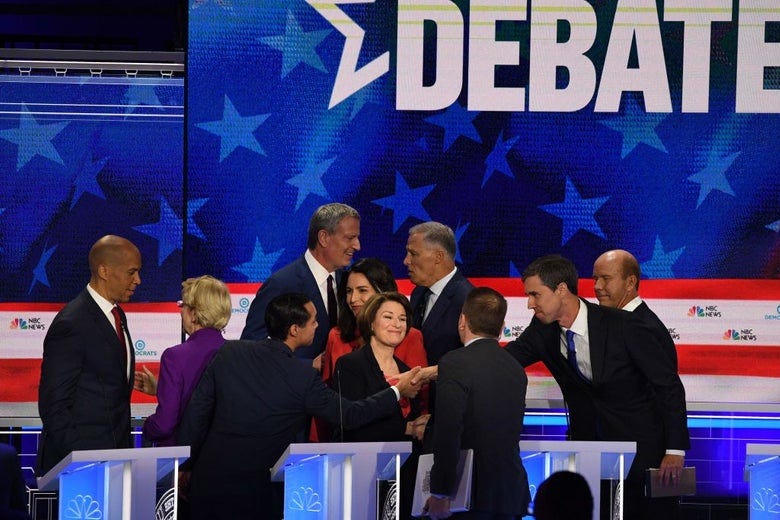Harris and Warren Surge as Biden Falls
Polling numbers show major shift as the requirements to make future debates get tougher

A new CNN Poll is out that has some substantial changes in polling numbers following the first Democratic Debates in Miami. Joe Biden’s double-digit lead, that many argued was inflated mostly by name recognition, has fallen 10 points after Thursday night, creating an opening for other top performing candidates. Elizabeth Warren and Kamala Harris, the clear winners from each night, have each jumped nearly 10 points, putting them in second and third place and edging out Bernie Sanders. Biden is still significantly favored at 43% when asked the question who “has the best chance to beat Donald Trump in the 2020 presidential election,” but he only leads Harris by five points overall as she makes the greatest gains to establish herself firmly in the top tier.

A breakdown of these new CNN polling results shows that Harris and Biden are fairly even in support among self-identified Democrats, white voters, younger voters, nonwhite women and those who actually watched the debates. Harris has now pulled away from Biden with support from liberals and white people with college degrees. In another switch-up, it’s now Warren who challenges Biden and Sanders with independent voters and she also beats Biden with support from liberals while pacing Harris and Sanders in the same category. Warren and Harris have similar numbers among younger voters, whites and whites with college degrees.
Biden's strongest support continues to be amongst black voters (36% Biden, 24% Harris, 12% Warren, 9% Sanders) and older voters (34% Biden, 14% Harris, 12% Warren, 7% Sanders). He also continues to carry more moderate and conservative Democratic voters (31% Biden, 11% Harris, 10% Warren and 8% Sanders).
The difference between the first and second tiers is steep. Pete Buttigieg, comes in at a distant fifth place at 4 percent, despite reporting an astounding $24.8 million donation total for his second quarter, which includes a mighty post-debate donation surge. Cory Booker and Beto O’Rourke are each sitting at 3 percent and Amy Klobuchar rounds out the second tier with 2 percent. Although these candidates still trail the first tier substantially, they serve as a qualifier for both the second round of Democratic debates at the end of this month and the third round of debates in September.

To make the next CNN debate stage in Detroit on July 30th and 31st, the rules remain the same as the first: candidates must reach 2 percent in four DNC-approved polls, and receive donations from 130,000 individual supporters. Michigan was a battleground state where Trump won by a narrow margin in 2016, and the subsequent election in 2018 has shown that the state will continue to be contentious in 2020 as well. Since many of the candidates who appeared in Miami have already qualified, you can expect to see them in Detroit with the same two-night format from before. It’s also likely that order will be determined by random draw again with stage placement based on polling, but there will likely be a mix-up of groupings so that bigger contenders have a chance to go head to head with those they missed in Miami.

The third debate on September 12th and 13th, which will be broadcast by ABC News and Univision, is where things will start to change as the DNC has significantly upped the requirements for qualification by basically doubling the requirements. Candidates need at least two percent support in four DNC sanctioned polls and 130,000 donors since the start of their campaign, that must include at least 400 donors each in 20 separate states to qualify. This approach makes it clear that the DNC recognizes the dangerousness of maintaining such a large candidate field for too long while making attempts to appear welcoming to outsiders. Since the surprising election of Trump in 2016 and the surge of Bernie Sanders, the Democratic Party has has to acknowledge the critical need to protect the legitimacy of a primary result and these first few debates seem like an attempt to do that.
“Only eight candidates — Biden, Sanders, Warren, Harris, Buttigieg, O’Rourke, Amy Klobuchar and Cory Booker — have routinely polled at 2 percent or higher. And the relatively narrow time frame from when polls are considered will make it harder for candidates to get lucky.” - Nate Silver, 538 Politics
This new CNN post-debate poll discussed above now helps all of the candidates in the top two tiers who nabbed over 2 percent as they secure the first of four polling requirements. While some breakout candidates like O’Rourke and Yang might easily fulfill their fundraising obligations, they might struggle more to hit the 2 percent polling in 4 specific polls. With only eight candidates (Biden, Sanders, Warren, Harris, Buttigieg, O’Rourke, Klobuchar and Booker) routinely hitting that 2 percent or higher and a fairly narrow time frame to satisfy the DNC requirement, it gives less than 10 candidates the chance to breathe easy.

Despite record viewing numbers for the first debate in Miami, this latest poll reveals that a majority of Democrats and Democratic-leaning Independents say they did not watch the debate at all. Forty-two percent said they watched either "all or most" of one or both debates, while 57 percent said they did not watch either. Given a very similar format and line-up for Detroit, we can expect similar viewing numbers across the board barring any major event that bolsters viewing. But look to the fall for things to heat up and for the debates to get more substantive as the field narrows considerably.
Amee Vanderpool writes the “Shero and a Scholar” Newsletter and is an attorney, contributor to Playboy Magazine, analyst for BBC radio and Director of The Inanna Project. She can be reached at avanderpool@gmail.com or follow her on Twitter @girlsreallyrule.



